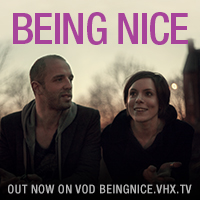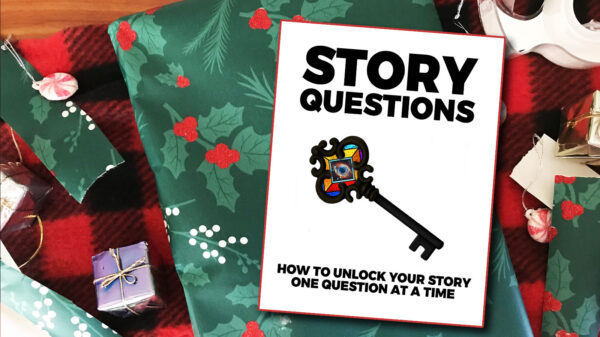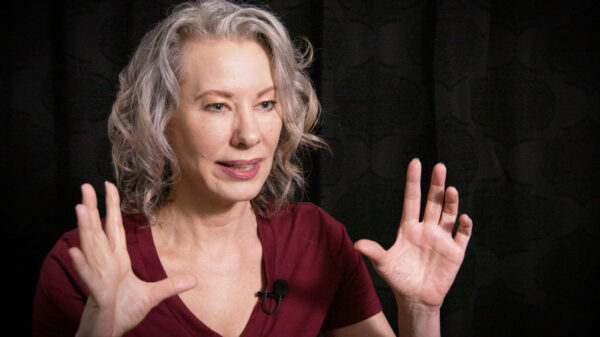
ANDREW BLACKBURN – WRITER/DIRECTOR/PRODUCER OF BEING NICE MOVIE
.
FC: Where did you grow up?
AB: I was born and grew up in the very sleepy and quaint Isle of Man, in the middle of the Irish Sea. When I was younger, the government started a film funding scheme, and the first time a Hollywood film shot in my town was about the coolest thing that had ever happened. Me and some friends spent the two days running around the set trying to talk to the actors – eventually one of the AD’s gave us a broom and asked us to sweep up some sawdust – for 50p! And thus my habit of getting paid very little to work in film was born.
FC: What were your plans upon leaving college? Did those ideas involve a creative career?
AB: I knew from about 12 or 13 that I wanted to make films as a job. After high school I studied Film & TV production for a year at a tiny film school on the Isle of Man. We learnt every aspect of filmmaking, on an entirely practical basis, so we all came out of the course with a really good grounding in film production. I moved to London and got a few jobs on set as a runner or camera trainee, planning to work my way up through the AD team, until I could start getting paid to direct. But while applying for production roles, I kind of fell into a job working for two advertising agency producers. I quickly realised that commercials would be a better route to eventually making feature films, and making money from directing. I was lucky enough to start directing commercials quite young and shooting spec ads with tiny budget things I learnt a lot about filmmaking in general. Helping out on other people’s films was also a great way to meet people in the business and build up contacts.
FC: What was your biggest misconception upon entering adulthood?
AB: That clothes cleaned themselves. What the hell? I’ve got to wash and dry them and fold them up and put them away??! Oh, and that getting a job in film would be really easy. It’s not – it takes ages and loads of emails and letters and knowing or making friends with people who might be able to help you.
“I wanted to make a film which, at its core, is about relationships, but I felt that the advertising industry would provide an interesting canvas to tell a story and show a number of different types of characters. I wanted everything about the film to feel as real as possible and I felt I could do that by setting the story somewhere I know pretty well.”

FC: What inspired the film BEING NICE?
AB: The personal answer…I have previously been in a very similar situation to Jen, seeing someone who already had a partner, and it took a while to get a handle on why things didn’t work out. I was interested in why some people stay in relationships that they’re not happy in – people that just need to have someone, or need someone to love them. For a lot of people, safety in a relationship is the most important thing. The thought of losing an average relationship and ending up with no one can sometimes lead to people not taking chances or risks with life. The ‘grass isn’t always greener’ concept.
The cliché of ‘write what you know’ also came in to play. Inter-office and interpersonal relationships have always fascinated me, and before directing commercials full time, I worked in advertising agencies producing and directing. Not to over-dramatise the industry – but for someone starting out – it’s very intense – and probably much more over the top and out of control than it is usually portrayed. I wanted to make a film which, at its core, is about relationships, but I felt that the advertising industry would provide an interesting canvas to tell a story and show a number of different types of characters. I wanted everything about the film to feel as real as possible and I felt I could do that by setting the story somewhere I know pretty well. It just happened to be shot in the same agency I used to work, and featured a lot of the night spots we used to frequent!
I knew that if we shot in a place I was familiar with, I could persuade my friends who worked there to come and be extras, and appear in small roles in the film. Hopefully, it adds an air of authenticity to the film and also saved a huge amount of time and money, which we obviously we didn’t have.

FC: Was BEING NICE your first feature film? How much excitement or hesitation surrounded you before ‘pulling the trigger’ and making the film?
AB: First feature, yep. The closest I’d got prior to Being Nice was co-directing a film that turned out to be well under feature length. A few years ago a friend and I both wanted to make features but were a bit daunted by the perceived difficulty of it. The common misconception is that a feature film is this big scary monster of a thing that will take you ages to make and you’ll need loads of cast members and loads of money. To get over this fear we entered a competition to write, shoot and edit a feature film in 30 days. The process was amazingly freeing and completely de-mystified feature film making. You realise that the actual prep and shooting process is very similar to short films, just longer – but not proportionately longer, only by a little bit.
.
.
I believe totally that you only learn how to make feature films by actually making a feature film. The process of editing and constructing a story is so different to making short films, the scale of the story has to be much bigger and the characters have to change and go through a kind of transformation.
With Being Nice, which I’d written and was producing and directing, the daunting part was knowing how much work it would be on the shoot. The really exciting part was knowing that I’d get to spend all day every day for a few weeks messing around with the actors, working on character and directing their performances – that’s the bit for me that makes all the other effort worthwhile.

FC: What made you want to tell a female journey?
AB: Personally, I was just more interested in exploring the female experience in that sort of situation. The main thing I wanted to look at with the film was different types of relationships and how they affect people’s growth and behavior. I felt that by having a female protagonist I could better show the different sides of a relationship, and from an audience perspective, I genuinely thought that people would be more interested in this story from a female’s perspective. Maybe because there’s such a great history of female coming-of-age films that audiences are more used to that set up.
FC: You have a brilliant quote in your trailer for BEING NICE: ‘Growing up = Embracing Change’ How has this presented itself to you? What’s been the most difficult?
AB: Personally, I sometimes find it tough to embrace change in people – or change in their routine. That’s one of the things I was interested in exploring with Jen’s home life. She has to come to terms with her mum’s new routine and her new partner; she has to start seeing her mum as just another human being. That process of seeing your parents as normal, fallible people was a real revelation to me and took a lot of getting used to – and it seems to happen almost overnight. But you then have the chance to build a much more mature and mutually beneficial relationship with your parents which is massively more fulfilling than the traditional, lopsided parent/child dynamic.
We actually shot a scene and didn’t use it for the end of the film which showed Jen and her Mum’s relationship changing, but I think the film hints enough that you assume their relationship had to mature anyway, it wasn’t necessary to show it.
FC: How long did it take you to write the script for BEING NICE? Where did you write it? Did any music, scenery or place help you in your writing?
AB: I sat down specifically to write a feature film and this story just seemed like the most obvious one to make – I knew it really well. So it took about 5 months of story planning – and as much as it’s not cool to admit it, I was following the Save The Cat 15 story beats method. I don’t think it’s the best way to write a story or a film, but it works really well to get your story out and fully structured and feel like a ‘movie’. I think in any film structure is key and this framework was a really great help to me at the time. It’s not something I use religiously, but in certain situations it’s very useful – or even to drill in three-act structure, which you can then diverge from. You need to know the rules to break the rules etc..
I wrote in a little cafe by my house – usually with index cards spread out over the table, shuffling and re-writing and ripping them up. I knew music would play an important part in the film, to help chart Jen’s state of mind, so I’d made a little playlist of tracks which I thought fitted the feel of the film to listen to while writing. During that writing period, when I was thinking about where the music for the film could come from, I went to a house party and saw Mat Riviere play. The instant I heard his first song I knew that his music had to score the film. It has such a perfect feel of growing up and the angst and difficulties that go with that, and it feels awkward and sometimes hard to listen to. But amongst all this he somehow manages to weave in amazing hooks that you keep humming for ages after. His music became the only thing I would listen to while finishing the script and it played a massive part in setting the tone of the film. He very kindly agreed to let us use his music in the soundtrack and I can’t think of anything more perfect to score the film.

FC: How did you get BEING NICE off the ground? What was the budget? What was your biggest expense?
AB: The budget was around £5k for the shoot then roughly £2k for the post production, mostly spent on expenses and food for crew and actors and some very small location fees. The bars I shot in were happy for me to put some money on a tab behind the bar – this acted as a location fee and also kept our extras (friends) very happy! We had an exotic travel day to Slough so the hotels for that part of the shoot bumped up the budget slightly.
Most of the equipment was borrowed so didn’t cost anything and most of the locations were houses of very kind and understanding friends or cast members so these came free as well. Making a tiny budget film you just have to take advantage of everything you have access to – you can’t be too proud to ask for help or equipment. It’s amazing how receptive and willing to help people are if they see you’re passionate about making something.
FC: Was the dialogue in BEING NICE improv? How much of a script did you write / how much improv did you encourage from your actors?
AB: Every single line of dialogue is improvised by the cast. But we did have a very tightly structured script – I wrote out every single scene in the traditional way, with the details of the location and the characters, just minus any dialogue. The scene descriptions would be along the lines of ‘Jen asks Nick about his relationship with Ali – she wants to know this or that. Nick says he doesn’t agree with long-term relationships because of this fact and recounts a story where such and such happened etc..’
So I, and the actors, had a good idea of how each scene should play out, but often the feel of a scene changed drastically as it was performed by the actors. We shot most of the film in sequence which meant we could re-work scenes based on how they developed in the actual locations and take into account what had come before. It also kept things fresh and exciting for the actors. I’d often give one actor something completely different to try from the previous take which would in turn lead to the other actors in the scene having to experience the moment in a spontaneous, authentic way.
FC: How many takes do you usually require from your actors?
AB: I don’t think we ever did more than 5 takes on any scene, and some scenes only needed 1 take. We covered almost every scene with two cameras – this helps massively with coverage of improvised dialogue scenes because you might never get the same thing twice. Two cameras ensured we could edit between different takes and cut the improvised scenes down to the length we wanted to suit the pace and flow of the story.
FC: Jessica Francis is amazing as Jen (as well as all your actors in BEING NICE). We understand this is her first lead role? How did you find her / know she was right for the role?
AB: I originally met Jessica 5 or 6 years ago through some friends, and shot a couple of spec commercials and a short film with her over the last few years. What always impressed me, in addition to her acting talent, was her dedication and work ethic. I wrote Jen specifically for Jessica – I wanted her combination of subtlety and sensitivity. I knew that the film was going to be a massive leap of faith for the lead actress and I knew Jessica had the right personality to take on the role. Luckily when I showed her the script she said yes.
Throughout the whole process she was so giving and generous with her time and, most of all, brave and fearless with her performance. Not to mention the fact that we used her own bedroom for Jen’s room, and her parents house for Jen’s mum’s house. Without a doubt I couldn’t have made the film without Jessica.
FC: What tips do you have to fellow filmmakers on working with an editor?
AB: Firstly, I would say, definitely do work with an editor, rather than trying to cut things yourself. It’s invaluable to have someone alongside you, firstly coming at things from a different personal perspective and secondly looking at the footage and scenes objectively. It’s almost impossible to be objective about your own footage. How you work with an editor is very much dependent on the project but in this case my editor Vee and I watched through absolutely everything together and marked what we liked before starting to edit. Often it’s great for an editor to have some time alone to put a rough cut together – but in a film with improvised dialogue (and the millions of different ways a scene can be edited) there’s so much not written into the script that I needed to be there to make sure my intention was present in each scene.

.
“I’m inspired by directors who are brave enough to allow things to not look pretty and nice, just to capture the action and the scene and let the aesthetics and look of a film appear organically.”
The edit on Being Nice was a genuinely fun experience, but certainly took a while. I wanted the film to feel real and the dialogue natural, but I wanted it to be tight and pacy. To achieve this we obviously had to cut a lot of the improvised dialogue out and make the scenes flow – so they felt almost as if they had been written, that they weren’t long meandering conversations. So we often cut between different takes to craft the scenes. This probably took longer than it would do for a scripted film, but the whole process was like writing the film all over again. My editor Vee and I had a really great time working this way.
FC: How did the decision to use VHX come about?
AB: VHX is a platform for self-release, anyone can use it. When I decided to self-distribute I researched pretty much every different option out there, from Vimeo On Demand to less movie-specific platforms like Tinypass. They all charge different amounts and offer varying benefits. What I loved about VHX was their ethos and approachable nature – the people who run the platform just seem like nice guys who care about filmmaking. And the ability to make a website with them from a template is a very handy tool. Also, the promotional options that come with their platform are really useful for building an audience – sending out free screeners to journalists, for example, is invaluable.
FC: Is there a film that makes you ache inside – ‘I Wish I Had Made This.’
AB: The film I always think of when that question is asked is ‘My Summer of Love’ by Pawel Pawlikowski. It affected me in such a massive way when I first saw it in the cinema, I had to run to another cinema and watch it again straight away. The story and performances are so authentic but it’s also beautifully photographed, it’s breathtaking at times.
Generally, the films which influence me are things that feel quite loose and spontaneous, but with really emotive and affecting stories. I’m inspired by directors who are brave enough to allow things to not look pretty and nice, just to capture the action and the scene and let the aesthetics and look of a film appear organically.
To list just a few films or directors which directly influenced the film: Bernard Rose – Ivansxtc & Kreutzer Sonata, Steven Soderbergh – Full Frontal & Girlfriend Experience, Mike Figgis – Timecode, the Duplass Brothers, Joe Swanberg, Bruno Dumont, John Cassavetes, Mike Leigh, Edward Burns, Werner Herzog, amongst loads of others.
FC: Where do you see yourself in 10 years and why? Did a guidance counselor ever ask this of you? (What was the answer then?)
AB: We didn’t really have guidance counsellors in my school, but I’ve always had a pretty clear career plan in mind! I love making longer form films, and everything I do is working towards me being able to do that full time. So in ten years, I’ll have made at least another 4 feature films, and directed plenty of TV episodes in different genres, and I’d love to be show-running a TV series I’ve originated, whatever the subject of that will be. I also love teaching so I’d hope to have a regular position teaching filmmaking somewhere. And hopefully there’s a wife and kids in there somewhere to keep me busy.
FC: Has a creative job that you’ve taken on ever let itself down?
AB: I work mainly directing TV commercials so it’s always a very fine balance between making something you can be really happy and proud of creatively, versus getting paid good money that can be used to work on personal projects. I try to always choose commercial projects that I know I can contribute to and learn from – and scripts I’m inspired by – but sometimes things can change so much from what you signed up for that it becomes a challenge to create something you can be really happy with. But I feel like these sort of experiences are useful because you learn how to adapt and see the best in a situation. Sometimes projects end up being a let down because they were over-ambitious to start with. Certainly, films I’ve made in the past weren’t as effective as they could have been because I was trying to walk before I could run. I see anything that turns out less good than you were hoping as a chance to learn something. A film professor once told me that being aware of the failings in your own work is the only way to really grow and get better at anything.
FC: Why do you think so many of us feel pressure to have a good title in trade of a smaller, lower-paying creative freelance life? (Family/societal pressure, ego, fear of money)
AB: I feel like fear of failing or ‘being found out’ is the main cause of people not doing what they really want to do in life – whether that’s a creative endeavor or a job they’d love to have. And this fear is usually mostly unconscious. The path of least resistance is often appealing because it’s safe and steady, there’s no chance of you mucking up and feeling like a failure. The problem is that, for a lot of people, it’s a big mental leap to get to the point where they can say “I know I can find enough work and make enough money to live happily and look after myself solely from this creative outlet”, so they stick to the less risky jobs. Not everyone who wants to be painter, for instance, has the potential/ability/determination/luck/a-million-other-factors to actually make it. So it’s probably realism, rather than pressure, that stops so many people from trying to follow their dreams. Being oblivious to reality can sometimes be useful though – I doubt many films would get made without it!
FC: Which situation would you consider easier 1) A ‘support system’ with loads of family/peer pressure on status, relationship choices, career path OR 2) Totally free with no one to catch you if something happens (but also no judgement or pressures)?
AB: Both options are essentially just different states of mind. I think with either option, you’re going to be judging yourself and the work that you do anyway. Only we can allow the judgements of others to affect us or how we live our lives. So whether we have an overbearing family/peer group or we’re completely free and unencumbered the pressures we put on ourselves will still be there. I think people use the excuse of family or peer pressure as a reason why they’re not doing what they really want to do – but those pressures can only affect us if we let them. The ideal is having a brilliant and supportive family and friend group coupled with the mindset that you can achieve anything if you work hard enough..that if you fail it doesn’t matter – because you can rebuild and come back even stronger. I think that comes down to having confidence in ones ability to succeed, however hard it is. Saying that, I’d have got nowhere if it wasn’t for the incredible support of my Mum when I was growing up and told her I wanted to be a filmmaker!

FC: What’s next for you creatively?
AB: In February this year I finished shooting the first of a series of 40-minute films, called ‘Home’, all focused on the same family. The plan is to release them online in 2015. The first part is about the parents, a mid-50’s couple, slowly coming to terms with their inevitable break up and the effects this has on every aspect of their lives. Similarly to Being Nice, I worked from a very loose script and spent a few weeks workshopping the characters and story with the main actors. We’re currently editing Part 1 then I’d like to shoot Part 2 early next year. Then I’m planning to shoot another improv-based feature film at the end of 2015.
BEING NICE – Feature Film Trailer UK 2014 from Andy Blackburn on Vimeo.
About Andrew Blackburn (writer/director/producer):
Born and raised in the Isle of Man, award-winning commercials director Andrew Blackburn has worked in advertising for the last 11 years, working his way up from runner with two experienced agency producers on to producer and director in Grey London’s TV department, before spending a year launching then running Grey’s in-house production company GREYfilm (now called GreyWorks). In 2010 he went freelance to concentrate solely on directing films and commercials, shooting TV commercials and online films for brands such as Kellogg’s, Pampers, Fairy, Lucozade, Nestle, Vanish and Fisher Price, amongst others. Andrew is repped in Europe by the Aylene Gardiner Agency and Savage in the USA.
His showreel is viewable at Carsickpictures.com.
At age 19 Andrew’s zero budget short film ‘Just Grey’, made during a year on Isle of Man Film’s much-celebrated Film & TV Production course, was shortlisted for BBC3’s 2003 New Filmmaker of The Year Award. His first feature film ‘Being Nice’ was selected as the gala opening night screening at the 2013 Isle of Man International Film Festival.
Andrew has recently completed filming Part 1 of a 3-part miniseries entitled ‘Home’, each focusing on a different member of a suburban family and their relationships inside and outside of the family unit.
CONNECT WITH ANDREW:
Being Nice is the feature film debut of writer/director Andrew Blackburn and tells the story of Jen (Jessica Francis in her feature debut), an aspiring artist in her early 20’s who, fresh out of university, begrudgingly takes a job in advertising. We follow Jen as, much to her surprise, she begins to enjoy working life and her rebellious nature causes her to connect with a romantically disillusioned colleague played by Alex Warren (Powder Room, Being Human).
Don’t miss Being Nice, when it is released on VOD (video on demand) platform VHX.tv on 14th November. Viewers will be able to stream or download the film for only $5.99 / £3.75. Watch Being Nice here: Beingnice.vhx.tv.
To watch the trailer here.
Directed/Written/Produced By:
Andrew Blackburn
Starring:
Jessica Francis
Alex Warren
Jackie Howe
Nicola Hollinshead
Dan Cohen
James Clossick
Gabriella Schmidt
Matt Jamie
Katerina Watson
Tommy Vine
Advertisement – Contains Affiliate Links
“Sincere indie cinema”
-Vodzilla
Buy BEING NICE on VOD for just $5.99
A Creative Music Agency Dedicated to
Crafting Your Dream Soundtrack


























